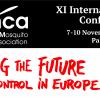Between all the persons who are in agreement with the present by-laws, there is formed an association named :
« European Mosquito Control Association » hereinafter referred to as « EMCA ».
Bylaws
Bylaws of the
EUROPEAN MOSQUITO CONTROL ASSOCIATION
(Last changes October 2021 -AGM)
ARTICLE 1. NAME AND PRINCIPAL OFFICE
The registered office of the EMCA is in Strasbourg, France.
Address: 12 rue des Pucelles 67000 Strasbourg.
It is registered in the « Registre des associations du tribunal d'instance de Strasbourg », and governed by articles 21 to 79 of the Local Civil Code, maintained in force by the law introducing French civil legislation of 1 June 1924, as well as by these bylaws.
The Headquarters of the EMCA shall be in any location designated by the Board of EMCA, hereinafter referred to as the Board.
EMCA is established for an unlimited term.
ARTICLE 2. OBJECTIVES AND PURPOSES
EMCA is a non-profit association.
The overall objectives of the EMCA are to:
1. Promote control of mosquitoes and black flies and other related subjects and organisms in the broadest sense and to disseminate information to its members and others in Europe and neighbouring regions.
2. Promote research on mosquitoes, black flies and other organisms.
3. Maintain strong links and collaboration with international organisations, associations and institutions such as WHO (World Health Organization), SOVE (Society for Vector Ecology), E-SOVE (European Society for Vector Ecology), ECDC (European Centre for Disease Prevention and Control), CDC (Centers for Disease Control and Prevention), EFSA (European Food Safety Authority), AMCA (American Mosquito Control Association), and PAMCA (Pan-African Mosquito Control Association ).
4. Exchange information on a regular basis through the website.
5. Organise workshops
Specific objectives are:
1. Maintaining the quality of life and the standard of public health by the surveillance and control of mosquitoes.
2. Promotion of European cooperation and participation in mosquito control projects in Europe and worldwide.
3. Promotion of the study, prevention and control of mosquito-borne diseases.
4. Development and implementation of new materials, techniques and tools for mosquito control.
5. Enhancing control measures based on Integrated Pest Management principles by favouring methods with low toxicological profiles and minimum environmental impact.
6. Supporting the preservation of wetland biodiversity by managing mosquito control with environmentally safe methods.
7. Specification, development and standardisation of rules of “good laboratory and field practice” in testing and application of insecticides, sampling methods, monitoring techniques, treatment procedures including issuing and harmonisation of guidelines for mosquito control (recommend and validate the “common principles” as it is called in the European directive 98/8/EC placing of biocide products on the market).
8. Organisation of educational and training courses, visits and staff exchanges between the members of the association, in order to improve professional skills in accordance with the EMCA objectives.
9. Promotion of mosquito control programmes for the public and authorities.
ARTICLE 3. MEMBERSHIP
Any agency, organisation, institution, association or individual involved in mosquito control and related subjects and interested in the goals of the association may become a member of the EMCA.
Categories of membership include regular, sustaining, student and honorary membership.
A3 1. S1. Regular members
Regular members shall pay annual dues as set forth by the Annual General Meeting. They shall participate regularly in the activities of the association, and support the implementation of its goals.
They shall be entitled to hold office, serve on committees, propose motions, vote in EMCA elections and participate at officially called business meetings. Each regular member shall have one vote.
A3. S 1. 2. Sustaining members
Sustaining members are all people contributing financially to the objectives of the association by paying annual dues established by the Annual General Meeting. They are three categories of sustaining members:
- Individual sustaining: individual or association
- Governmental sustaining members: local or national governmental agencies
- Commercial sustaining members: commercial organisations
Names of sustaining members are listed annually in the publications of the association.
Sustaining members have the same rights and privileges as regular members.
A3. S1. 3. Student Members
Any undergraduate or graduate student enrolled in an accredited university is eligible for student membership. Students have to present the status documents at the time of application and at each renewal date. Student members shall pay annual dues proposed by the Board and approved by the Annual General Meeting . They are entitled to serve on committees, propose motions, vote in EMCA elections and participate at officially called business meetings.
A3. S1. 4. Honorary Members
Any person who has rendered exceptionally distinguished service in the various fields of mosquito control and related work may be appointed to honorary membership. Any individual who accepted this nomination proposed by the Board and approved by the Annual General Meeting becomes an honorary member. Honorary members shall enjoy the same privileges as regular members and shall pay no dues.
New members are admitted by the Annual General Meeting.
Members may quit the association:
- By written resignation, at least three months before the end of the year.
- By expel for non-payment of the dues for two years, after appropriate reminders. Expel is pronounced by the Annual General Meeting according to the proposal of the Board.
- By exclusion as a sanction for all act constituting a material loss or moral harm to the association. Expel is pronounced by the Annual General Meeting according to the proposal of the Board.
ARTICLE 4. FINANCES
Proceeds of the association are composed of dues of the members, grants from governmental or private organisms, donations and legacies, income from its funds and all other resources that are not inconsistent with the laws in force.
The amount of annual dues for each category of members is set yearly by a proposal of the Board and approval by Annual General Meeting.
Membership fees are due on 1 January. New membership dues received before October 1 shall be counted as members for the current year. New membership dues received on or after October 1 shall be credited to the fiscal year beginning on the following January 1.
A member who has not paid the membership fee for two consecutive years will automatically be proposed for expulsion
Expenditures are ordered by Treasurer. The Treasurer may delegate part of his powers, by written advice and with Board approval, to any other member of the association.
All monies due to the association will be collected, disbursed, and accounted for by the Treasurer. The Treasurer will provide detailed financial reports to the Board and the EMCA membership.
A bank account shall be opened at the registered office address. The President and the Treasurer are authorised to operate the account. They may possibly delegate this authorisation to other members of the association, with the approval of the Board, by a letter signed by the President.
No officer or member of the association will be personally liable for any debts, liabilities, and obligation of the association.
Board members shall receive no salary for their services rendered to EMCA
The fiscal year will commence January 1 and ends December 31 of each calendar year.
ARTICLE 5. ADMINISTRATION
The seven voting members of the Board are the acting President, the Past President, the President-elect, and four members, all seven elected for a two-year term.
The one non-voting members of the Board is the Treasurer who is elected for a three-year term.
Meetings of the Board of EMCA shall be called at least once a year or as often as necessary by the President. Any member of the Board may request a meeting by a written demand to the President. If necessary, meetings also may be held electronically (video-conference, electronic voting).
The presence of at least half of the members of the Board is necessary to take valid decisions. In case the quorum will not be achieved, another meeting shall be called, which shall deliberate validly whatever the attendance may be.
Decisions by the Board shall be taken by a simple majority of voters of the members present.
In case a member of the Board is unable to attend a meeting, he may give written delegation of his voting privileges to another member of the Board. No member of the Board shall receive more than two proxies.
The President-elect shall be elected for a two-year term by a ballot sent to all EMCA members in good standing, or by secure electronic voting.
The elected officer shall serve for two years as President-elect before serving for two years as President, and the following two years as past-President.
The four other members shall be elected for a two-year term by a ballot sent to all EMCA members in good standing, or by secure electronic voting.
The Treasurer shall be elected for a three-year term by the Annual General Meeting . Re-election is possible.
In case of a vacancy in the office of President and/or President-elect, the next officer in line would ascent to the office so vacated. Vacancy of any other office, including members of the Board or Treasurer, shall be filled by Board action.
ARTICLE 6. DUTIES OF THE BOARD AND OFFICERS
The Board shall govern, guide and supervise the activities of EMCA. The Board shall define and specify the programme and policy of EMCA. It shall have the following power, responsibilities, and duties:
1. Opt rules to govern its own proceedings,
2. Supervise the financial administration,
3. Establish the annual budget,
4. Confirm and approve the establishment or abolition of committees and appointments of individuals as members or chairpersons of committees,
5. Prescribe policies governing the activities and functions of the EMCA,
6. Determine the place and date of annual and special meetings and notify the membership thereof,
7. Report its actions and decisions to the membership at each Annual General Meeting for ratification or approval and publish these reports on the EMCA website,
8. Propose eligible candidates for the election of President and Treasurer
9. Propose the amount of annual dues for each category of members,
10. Propose the nominations of honorary members, admission of new members and exclusions.
11. Decide on the editorial policy of EMCA in accordance with Article 9. EMCA Publications.
The President shall ensure that the by-laws are respected and that the moral interests of the association are safeguarded. He shall supervise the conduct of the association's business and ensure that the decisions of the management are respected.
He shall perform the functions of representation: legal, judicial and extra-judicial representation of the association in all acts of civil life. He or she may delegate to other members of the management for the exercise of his or her representative functions.
The President shall have the following specific duties:
1. Chairs all meetings,
2. Be an automatic member of all committees
3. Validate and sign the minutes of General Meetings and Board Meetings,
4. Present questions of policy for consideration by the Board,
5. Call special meetings,
6. Initiate special action by correspondence or other
7. Appoint representatives to act in the name of the EMCA with instructions when needed,
8. Perform and organise any action called for by the Board such as: current activities, to promote the development of the EMCA, and to coordinate the objectives, policies, responsibilities and services of the EMCA,
9. And perform other duties normally expected of the office.
The President-elect shall act in the absence of the President and shall assist the President whenever requested. The past-President shall assist the President and the President-elect with the duties of their offices as directed.
The Treasurer shall have the following duties:
1. To serve as custodian of funds, title deeds, business papers, bonds and other securities belonging to the EMCA,
2. To manage, in consultation with the Board, the reserve funds of the EMCA in such a manner as to ensure their safe and steady growth,
3. With Board approval, to engage a certified public accountant to audit the books annually,
4. To prepare an annual financial report for the past financial year - and submit it to the Annual General Meeting for approval,
5. To prepare the budget for the next fiscal year and submit it to the Annual General Meeting for approval,
6. To perform other duties relating to the office of Treasurer as may be prescribed by the Board,
7. To record and keep all EMCA Annual General Meetings and Board Meetings minutes and keep the membership informed through the official publications channels,
8. To administer the daily EMCA affairs by providing the necessary leadership and guidance to hired personnel and volunteer help,
9. To have custody of the EMCA seal and execute with the President all EMCA legal documents and affix the seal thereto.
Two EMCA members in good standing shall be proposed by the Board and elected by the Annual General Meeting as Auditors for a two-year term. Re-election is possible.
The Auditors have to examine the accounts presented by the Treasurer and make the yearly audit to be presented to the Annual General Meeting.
The association may call on external assistance, either in the form of services or the hiring of staff. The Board will set the terms and conditions (duration, remuneration, choice of service providers or employees) and present the project to the Annual General Meeting for approval. The President will sign the relevant contracts.
ARTICLE 7. MEETINGS AND ELECTIONS
The EMCA shall hold Annual General Meetings open to all EMCA members in good standing. The meeting shall be called by the President. If the general meeting cannot meet physically, it may meet electronically, by a decision of the Board.
Annual General Meetings shall have the following responsibilities and duties:
1. Hear the annual report of the Board and approve its proposals,
2. Approve the annual financial report and the proposed budget for the next year,
3. Approve the amount of annual dues for each category of members,
4. Approve the admission of new members, election of honorary members, expulsion of members,
5. Elect the Treasurer, on the proposal of the Board,
And generally exercise all the responsibilities that are not devolved to another body.
The place and date of Annual General Meeting shall be determined by the Board and announced through the website, not less than three months before the date set for said meeting. In the case of an electronic meeting, the period is reduced to one month.
Each EMCA member shall have one vote at the Annual General Meeting. Decisions by the Annual General Meeting shall be taken by a simple majority of voting members.
The presence of at least 20 per cent of the members of the EMCA is necessary to take valid decisions. In case the quorum will not be achieved, another meeting shall be called, which shall deliberate validly whatever the attendance may be.
In case a member of the EMCA is unable to attend a meeting, she or he may give written delegation of his voting privileges to another member of the EMCA. No member shall receive more than two proxies.
Minutes of the meetings will be recorded. They will be endorsed by the signature of the President and the President-elect.
EMCA shall hold international workshops, usually in a biennial sequence, which shall be open to the public. The place and date of these meetings shall be determined by the Board and announced through the website not less than six months before the date set for the said workshop.
A7. S3. 1. Election by ballot
The President shall prepare a ballot containing the names of the nominees for the positions to be filled by election, with a space for a write-in candidate for each position. The ballots shall be mailed at least three months ahead of the Annual General Meeting when the handover comes into effect.
Written ballots, in order to qualify for counting, shall be returned to the EMCA office in an unmarked envelope within a sealed envelope bearing the member’s signature on or before the deadline indicated on the ballot.
The President in the presence of two EMCA members will open the unmarked envelopes containing the ballots not earlier than one week after the deadline. Any member wanting to witness the count may do so by previous notice.
The successful candidates will be notified of their election within seven days after the count and at least two weeks prior to the Annual General Meeting. In the case of tie votes, the election will be decided by a majority vote of the members attending the next Annual General Meeting. The same procedure will be adopted in the case of electronic voting whenever this will be used.
A7. S3. 2. Electronic election
The election by correspondence may be replaced by an electronic election, by a decision of the Board. A procedure shall be put in place to ensure verification of voters and anonymous processing of data.
ARTICLE 8. EMCA COMMITTEES
The establishment of committees focusing on key subjects within EMCA may be proposed by members in good standing. The written proposal for new committees has to be submitted to the Board via the President. The Board will submit proposed committees to the Annual General Meeting for approval along with the names of the chairperson and the members. The chairperson and the members of a committee will be appointed for a three-year period. Re-appointment is possible
ARTICLE 9. PUBLICATIONS OF THE EMCA
The "Journal of the European Mosquito Control Association" (JEMCA) shall be the official open-source scientific publication platform. It can be hosted directly on the EMCA website, or preferably with a professional publisher, on the decision of the Board.
The Editorial Board decides on the acceptation of submitted manuscripts. It shall consist of at least three members: The Editor-in-chief and two Associate editors. The members shall be appointed by the Board and serve for a three-year term with an option of re-appointment.
ARTICLE 10. AMENDMENTS TO THE BYLAWS
These bylaws may be amended at the Annual General Meeting of the EMCA by a two-thirds majority vote of members present, or in case of an electronic General Meeting, by secure electronic voting by the same majority.
All proposals to amend the bylaws shall be submitted to the President at least three months prior to the date of the Annual General Meeting . Proposed amendments shall be sent to all members at least one month prior to the Annual General Meeting.
ARTICLE 11. TERMINATION
An Extraordinary General Meeting shall be called by the President to pronounce the dissolution of the association, with the same rules as for the Annual General Meeting.
On the proposal of the Board, assets shall be distributed to one or more other associations with similar purposes than the EMCA. All grants received for a specific purpose that was not spent shall be returned. No member of the association may pretend to a part of the assets.
ARTICLE 12. ADOPTION OF THE BYLAWS.
EMCA bylaws were adopted by the Constituting General Meeting held on 28 March 2000 at Speyer, Germany.
Founding signatory members:
Carles ARANDA PALLERO (SPAIN) ; Pierre BAUER, VALENT BIOSCIENCES CORP. (FRANCE) ; Matthias BECK (GERMANY) ; Norbert BECKER (GERMANY) ; Romeo BELLINI (ITALY) ; Gilles BESNARD (FRANCE) ; Centro Agricoltura Ambiente CAA (ITALY) ; Jean COUSSERANS (FRANCE) ; CULINEX GMBH (GERMANY) ; Ernest DANKWA, VALENT BIOSCIENCES CORP. (USA) ; Peter DECHANT (USA) ; Guy DYEN (FRANCE) ; EID A.I.R.S. (FRANCE) ; Roger ERITJA (SPAIN) ; Raúl ESCOSA (SPAIN) ; Rémi FOUSSADIER (FRANCE) ; Pantelis GIANNOGLU (GREECE) ; Aleksandra GLINIEWICZ (POLAND) ; Norman G. GRATZ (SWITZERLAND) ; Raymond GRUFFAZ (FRANCE) ; Jacques GUILLOTEAU (FRANCE) ; Heiko KOTTER (GERMANY) ; HUNGARIAN MOSQUITO CONTROL ASSOCIATION (HUNGARY) ; ICYBAC MOSQUITO CONTROL GMBH (GERMANY) ; Hans JERRENTRUP (GREECE) ; Dr. Paul SCHÄDLER, President of the KABS (GERMANY) ; Achim KAISER (GERMANY) ; Saïd KARCH (FRANCE) ; Steve KRAUSE, VALENT BIOSCIENCES CORP. (USA) ; Oszkár KUFCSAK (HUNGARY) ; Roland KUHN (GERMANY) ; Christophe LAGNEAU (FRANCE) ; Peter LÜTHY (SWITZERLAND) ; Minoo B. MADON (USA) ; Luka MALES (YUGOSLAVIA) ;Yoël MARGALITH (ISRAEL) ; Ivan MARKOVIC (YUGOSLAVIA) ; Eduard MARQUÈS I MORA (SPAIN) ; Enrih MERDIC (CROATIA) ; Josip MILAS (CROATIA) ; Henriette NAGY (HUNGARY) ; Dusan PETRIC (YUGOSLAVIA) ; Françoise PFIRSCH (FRANCE) ; Peter MERCATORIS, PHOENIX AVIATION SERVICE (GERMANY) ; Frantisek RETTICH (CZECH REPUBLIC) ; Anna SAMANIDOU (GREECE) ; Paul SCHÄDLER (GERMANY) ; Francis SCHAFFNER (FRANCE) ; Konstantinos SIMOGLOU (GREECE) ; SIVOM DE LAUTERBOURG (FRANCE) ; David G. SULLIVAN (USA) ; Yves TOURAINE (FRANCE) ; Amos VILAMOVSKI (ISRAEL) ; ZANUS CORPORATION (USA) ; Marija ZGOMBA (YUGOSLAVIA)
Latest News
23rd ESOVE Conference
20/01/2024XI INTERNATIONAL EMCA CONFERENCE & 4th EMCA TRAINING COURSE, PALMA, MALLORCA, SPAIN 3rd ANNOUNCEMENT
01/06/2023, Last update: 26/09/23RESULTS OF PRESIDENT ELECT ELECTIONS 2023
01/09/2023EMCA office
12 rue des Pucelles
67000 Strasbourg, France
EMCA office, c/o - Ecodevelopment SA
PO BOX 2420
57010 Filyro, Thessaloniki, Greece
(+30) 6970 975 001 office@emca-online.eu











